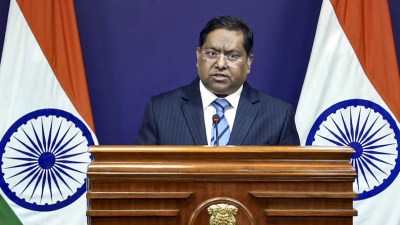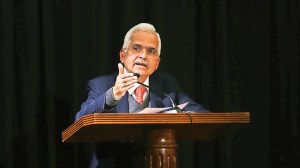Back to the Great Game
As China prepares to host a special summit of the Shanghai Cooperation Organisation next week, the geopolitics of Central Asia has begun to acquire a sharper edge.

As China prepares to host a special summit of the Shanghai Cooperation Organisation next week, the geopolitics of Central Asia has begun to acquire a sharper edge.
The new tensions between Russia and the United States and the continuing uncertainty in Sino-US relations are drawing Moscow and Beijing closer to each other. Washington suspects that Beijing and Moscow are trying to limit its influence in Central Asia through the SCO.
The SCO is one international organisation that China can legitimately claim to have set up and nurtured. That precisely is the reason why China8217;s leadership role in SCO is being monitored closely in the United States.
In quick succession last week, the Chinese President Hu Jintao and his Russian President Vladimir Putin spoke of the importance of the SCO which is gathering in Shanghai next week to mark the fifth anniversary of the organisation.
While President Hu underlined the importance of the strategic partnership with Moscow and insisted that the SCO is not directed at third parties, President Putin was more forthcoming.
In an indirect reference to the US, Putin cautioned against the attempts to set up 8216;8216;regional competition8217;8217; with the SCO. A few weeks ago, the US Vice President Dick Cheney swung through Central Asia accusing Russia of blackmailing the region with its control of the oil resources and pipelines.
China, Russia, Kazakhstan, Kyrgyzstan, Tajikistan and Uzbekistan are full members of the organisation and India, Pakistan, Iran, and Mongolia are observers.
Pushing America Out
The new significance of the SCO came to international attention when the SCO, egged on by China and Russia demanded last year that US set a timetable to withdraw its bases and facilities from Central Asian Republics.
After the 9/11 attacks on New York and Washington, the US had acquired a significant military presence in the region. Although Moscow and Beijing initially supported the US war on terror and did not object to American deployment of troops in the region.
Nearly five years after 9/11, Beijing and Moscow fear that the US is constraining their power in a region that is full of energy resources and shares long borders with China and Russia.
Meanwhile, the US policy in Central Asia is faltering amidst the pursuit of such competing objectives as promotion of democracy and military access. The SCO pressure on Washington has improved the bargaining power of the Central Asian republics with the US.
Since last year, the US forces had to vacate Uzbekistan, where President Islam Karimov was upset with American support to democracy in his country.
The US also has been compelled to negotiate with Kyrgyzstan on the continuing presence of its troops. Meanwhile Russia is upgrading its own military presence in Kyrgyzstan.
The pressure from the SCO against the U.S. could have a fallout in Afghanistan. China and Russia, in turn, are worried about the growing military presence of the NATO in Afghanistan and more fundamentally the strategic partnership agreement signed by Afghan President Hamid Karzai and US President George W. Bush in May 2005.
Shanghai Spice
As the US, China, and Russia jockey for position in Central Asia, India is likely to maintain a watchful distance from the new geopolitics of the region.
India8217;s low-key participation in the SCO summit will be led by the petroleum minister Murli Deora. Pakistan in contrast will be represented by President Pervez Musharraf.
There is also the talk about the Iranian President Mahmoud Ahmadinejad particiating in the Shanghai summit. If he does show up, Ahmadinejad would add political spice to the meeting.
By serenading Ahmadinejad in Shanghai, Beijing will have an opportunity to remind Washington of its new leverages in Tehran and its potential to make trouble for the US in Central Asia.
It might be just as well that India has decided not to send Prime Minister Manmohan Singh to Shanghai. That question was settled by considerations of protocol. There is no way an Indian Prime Minister would attend a multilateral meeting as an observer.
When the then external affairs minister Natwar Singh went to the SCO last year to represent India as a newly admitted observer to the organisation, he refrained from either endorsing or opposing the demand of the organisation on the US to set a time table for military withdrawal from the region.
As an observer, India was neither consulted nor asked to support the demand. While India has refrained from comment, it stands to reason that India has no desire to see the international forces led by the US vacate Afghanistan.
India knows that would only make it easier for the Taliban to regain power with the help of Pakistan. India8217;s hopes to sustain its rising strategic profile in Afghanistan would depend on the ability of the Karzai regime to overcome its current troubles with the US assistance.
Deora8217;s brief in Shanghai will focus on improving India8217;s prospects for energy and security cooperation with all the Central Asian countries on a bilateral basis.
China8217;s slick move
While Murli Deora eyes the huge energy resources of Central Asia, China is leaps ahead in tapping the hydrocarbons of the region. Late last month, oil began to flow for the first time into China from Central Asia.
The inauguration of the 970-km long oil pipeline between Kazakhstan and China marks a new phase in the oil politics of the region. This is the first eastward flow of Central Asian oil and China8217;s first piped import of petroleum.
The project is expected to eventually grow into a 3000 km pipeline moving 20 million tons of oil from the Caspian Sea to eastern China every year. That would amount to 15 per cent of China8217;s current imports of crude oil.
The pipeline connection with Kazakhstan would also let China theoretically access Russian oil in future. While the Russian and Kazakh pipeline systems are interlinked, Moscow is yet to take the decision on large scale oil supplies to China.
Meanwhile the Kazakh pipeline will also help reduce Chinese dependence on the Malacca straits for its energy security.
- 01
- 02
- 03
- 04
- 05































